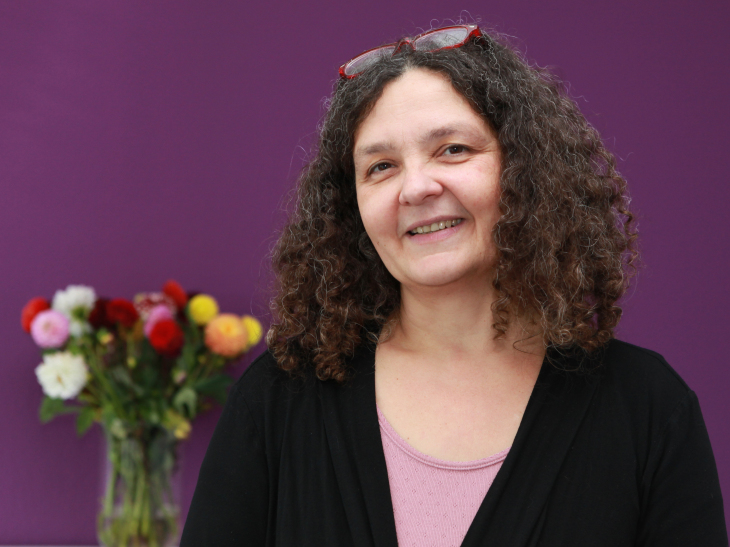Prof. Dr. Corinna Schrum is new Director of the Institute of Coastal Research
Prof. Corinna Schrum has been leading the Division for Systems Analysis and Modelling at the Institute of Coastal Research since October 1st, 2015.
After her university studies, earning her doctorate and obtaining a research assistant position in Hamburg, the oceanographer went to Denmark for a year-and-a-half before accepting a professorship at the University of Bergen in Norway. Her main focus of research lies in models that describe what occurs on the coasts in the most comprehensive possible manner and that take into consideration numerous chemical, physical, biological and climatic processes.
Read an in-depth interview with the scientist here:

Prof. Corinna Schrum Foto: HZG/ Heidrun Hillen
Norway is considered a country with a high standard of living and Bergen is a beautiful city. What made you return to Germany and take up a directorship in the Institute of Coastal Research at the Helmholtz-Zentrum Geesthacht?
I was especially drawn to this position because I liked the outlook—the possibilities at the Institute of Coastal Research are most attractive. The complex interactions between atmosphere, ocean and land can be examined here in detail. I would like to develop that further.
The Division for Systems Analysis and Modelling is concerned with climate on the coasts. Where would you like to see emphasis in the future?
Climate and climate change are of crucial importance for the coasts. They have considerable influence on what happens in this area and on the way human populations utilise the land and the sea. Direct influence by human populations is also important—we use the coasts for various endeavours and at times in competing ways. This can give rise to conflicts, for example, if tourists or fisheries find offshore wind parks disruptive. Such processes will be shifted further into the foreground in our future research. We want, for example, to predict more precisely which consequences offshore wind parks have on the marine fauna and how these effects will be transformed with climate change.
The institute encompasses two further divisions in addition to climate research: “Biogeochemistry in the Coastal Seas” which is concerned with topics such as pollutant analysis, and "Operational Systems", which develops new measurement methods. How do you envision cooperation between these realms?
The cooperation will be very close as the topics cannot be isolated from one another. Biogeochemistry is now increasingly dependent on computer modelling too. And the cooperation in the area of “Operational Systems” is about using computer models and observational systems closely together. This is the only way the Institute of Coastal Research can cover the entire spectrum and further develop its expertise.
What are your objectives? What do you want your institute to achieve in the next five years?
The first and foremost goal is to further develop modelling tools. Great progress has actually already been made in this area, but much still remains to be done: what occurs in the ocean, the atmosphere and on land has, to a large extent, been treated separately thus far. But these three realms all come together on the coasts. Current research questions therefore no longer focus on the ocean or the atmosphere alone, but on their interactions. How do the material and energy exchange processes look? This falls under the key term “earth system model”. This is where we must put our modelling tools to work.
In your role as institute director, do you see yourself more as a research manager in the future or do you envision yourself active in research too?
I plan to actively further my research – even if I'll naturally have a lot of other responsibilities. But I do consider it important to remain involved in science and to undertake research myself, which is best done with colleagues here. I’m currently coordinator for an EU project called SEAMAN, which is developing three-dimensional methods that can describe coupled physical, biological and chemical ocean processes. Even after the project ends, I will continue working on the topic and devote special attention to pollutant cycling in the coastal ocean.
What are you most looking forward to in your new position? Are there any concerns, for example, regarding the proverbial German bureaucracy?
Initially, I need to closely acquaint myself with the institute and get an overview of the research expertise and topics of those who work here. I sense great enthusiasm within the institute and I'm very happy about that. I'm not afraid of matters of bureaucracy. It’s not that bad in Germany; it’s an issue that we can overcome.
You were in Norway for nearly ten years. How will the move to Geesthacht personally change your life?
It will be a time of commuting for me. My husband still works in Norway and my two youngest children live there. But we’ve retained a close connection to the Hamburg region throughout the years. We visited often because my older children live here. I’m not moving to a foreign place; I feel at home here.
Editor: Frank Grotelüschen
Kontakt
Institut of Coastal research
Phone: +49 (0)4152 87-1833
Fax: +49 (0)4152 87-2832
E-mail contactHelmholtz-Zentrum Geesthacht
Zentrum für Material- und Küstenforschung
Max-Planck-Str.1
21502 Geesthacht
